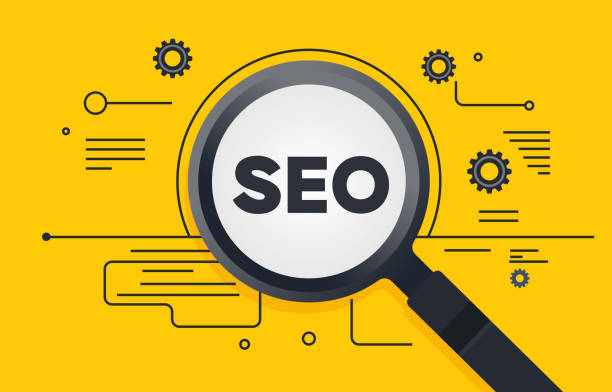What is SEO and Why is it Important?

What is SEO and Why is it Important?
#SEO stands for Search Engine Optimization.
This process includes a set of techniques and strategies that are aimed at improving the ranking of a website in search engine results such as Google, Bing, and Yahoo.
The main goal of SEO is to increase organic (non-paid) website traffic.
The importance of SEO in today’s digital world is very high.
Imagine you have an online store, but no one knows it exists.
SEO helps you get in front of millions of users who are looking for your products or services.
By improving your website’s ranking in search results, you can attract more traffic, find new customers, and ultimately increase your sales.
SEO is not just about ranking higher; it’s also about improving the user experience.
A well-SEO’d website is usually faster, more user-friendly, and more reliable.
This leads to increased user satisfaction and higher conversion rates.
Optimizing the user experience also shows search engines that your website is valuable.
As a result, it improves your ranking.
In total, SEO is a long-term investment that can have a significant return for your business.
Do you have an online store but your sales are not as expected? Rasaweb solves your problem forever with professional online store designs!
✅ Significant increase in conversion rate and sales
✅ Unparalleled user experience for your customers
⚡ Click to get free consultation with Rasaweb!
SEO Basics: Keywords and Keyword Research

SEO Basics: Keywords and Keyword Research
One of the most important aspects of SEO is keyword research.
Keywords are the phrases that users enter into search engines to find the information, products, or services they need.
Choosing the right keywords that are relevant to your business is the first step to success in SEO.
The keyword research process involves identifying and evaluating the words that your target audience is searching for.
To do this, you can use various tools such as Ahrefs, Moz Keyword Explorer, Ubersuggest, and Google Keyword Planner.
These tools help you find keywords related to your business, check their search volume, and assess the competition.
When choosing keywords, pay attention to these points:
- Relevance: Keywords should be directly related to the content of your website.
- Search Volume: Keywords should have a significant search volume to drive relevant traffic to your website.
- Competition: Keywords should have a reasonable level of competition.
Choosing keywords with very high competition may render your SEO efforts ineffective.
After identifying the appropriate keywords, you should use them strategically in your website content.
This includes using keywords in page titles, meta descriptions, body text, images, and links.
On-Page SEO: Optimizing Content and Website Structure

On-Page SEO: Optimizing Content and Website Structure
On-Page SEO refers to optimizing elements on your website that you can control.
This includes optimizing content, website structure, title tags, meta descriptions, and other related factors.
The goal of On-Page SEO is to improve the user experience and help search engines better understand the content of your website.
The most important elements of On-Page SEO are:
- Content: The content of your website should be high-quality, relevant, and valuable.
Use keywords naturally in your content and try to answer the questions and needs of your audience. - Title Tags: Title tags are the titles of each page of your website and are displayed in search results.
Title tags should be engaging, concise, and contain the main keywords. - Meta Descriptions: Meta descriptions are summaries of the content of each page of your website and are displayed below the title tags in search results.
Meta descriptions should be engaging and persuasive and encourage users to click on your website link. - URL Structure: The URL structure of your website pages should be clear, logical, and contain keywords.
- Images: Your website images should be optimized.
Reduce image sizes and use ALT tags to describe the images. - Internal Links: Internal links are links that connect different pages of your website to each other.
Internal links help improve the structure of your website and help search engines better understand your website’s content.
On-Page SEO optimization is an ongoing process.
By optimizing your website’s content and structure, you can improve your website’s ranking in search results and attract more traffic.
| SEO Element | Description | Importance |
|---|---|---|
| Title Tag | The title of the page that is displayed in search results. | Very High |
| Meta Description | A summary of the page’s content that is displayed in search results. | High |
| Content | The main text of the page, images, and videos. | Very High |
| URL Structure | The page address. | Medium |
| Internal Links | Links to other pages within the same website. | High |
Off-Page SEO: Link Building and Domain Authority

Off-Page SEO: Link Building and Domain Authority
Off-Page SEO refers to activities that are performed outside of your website to improve your website’s ranking in search results.
The most important aspect of Off-Page SEO is Link Building.
Link building is the process of acquiring links from other websites to your website.
Links from reputable and relevant websites show search engines that your website is reputable and valuable.
The more inbound links (Backlinks) your website has, the higher your ranking in search results will be.
There are various methods for link building, including:
- Producing Quality Content: Quality and valuable content naturally attracts inbound links.
- Communicating with Bloggers and Journalists: Communicating with bloggers and journalists and providing them with valuable information can lead to acquiring links from their websites.
- Participating in Forums and Social Networks: Participating in forums and social networks and providing helpful opinions and answers can lead to acquiring links from your profile.
- Registering the Website in Directories: Registering the website in reputable directories can help with link acquisition.
In addition to link building, other factors also play a role in Off-Page SEO, including:
- Domain Authority: Domain Authority represents the power and authority of your website.
- Brand Reputation: Your brand’s reputation in the online world can affect your website’s ranking in search results.
Off-Page SEO is a time-consuming and complex process, but with effort and the right strategy, you can improve your website’s ranking in search results and attract more traffic.
Are you tired of your online store not being able to generate as much revenue as its potential? Rasaweb, a specialist in professional online store design, solves this problem forever!
✅ Increase in sales rate and income
✅ High loading speed and unparalleled user experience
⚡ Get a free online store design consultation
Technical SEO: Optimizing Speed and Crawlability

Technical SEO: Optimizing Speed and Crawlability
Technical SEO refers to optimizing the technical aspects of your website that affect its crawlability, indexability, and ranking in search results.
The goal of Technical SEO is to ensure that search engines can easily crawl your website, understand its content, and rank it correctly in search results.
The most important aspects of Technical SEO include:
- Website Speed: Your website speed should be high.
Slow websites provide a bad user experience and are penalized by search engines. - Crawlability: Search engines should be able to easily crawl your website.
To do this, you should use an XML Sitemap and properly guide search engine bots. - Indexability: Search engines should be able to index the content of your website.
To do this, you should ensure that no pages on your website are blocked by search engine bots. - Mobile Compatibility: Your website should be compatible with mobile devices.
Most internet users use mobile devices to search, so your website should display correctly on these devices. - Security: Your website should be secure.
Use HTTPS protocol and protect your website from cyber attacks.
Technical SEO is a complex process, but by following its principles, you can improve your website’s ranking in search results and attract more traffic.
SEO Analytics: Measuring and Tracking Performance

SEO Analytics: Measuring and Tracking Performance
SEO Analytics is the process of measuring and tracking your website’s performance in search results.
With SEO Analytics, you can identify the strengths and weaknesses of your website and optimize your SEO strategy.
SEO is a repetitive process that requires continuous analysis.
The most important SEO Key Performance Indicators (KPIs) include:
- Organic Traffic: Organic traffic is the traffic that comes to your website through search results.
- Keyword Ranking: Keyword ranking represents the position of your website in search results for specific keywords.
- Bounce Rate: Bounce Rate is the percentage of your website visitors who leave your website after viewing only one page.
- Conversion Rate: Conversion Rate is the percentage of your website visitors who perform a specific action, such as purchasing a product, filling out a form, or subscribing to a newsletter.
For SEO Analytics, you can use various tools such as Google Analytics, Google Search Console, and Ahrefs.
These tools help you collect data related to your website’s performance, analyze it, and create custom reports.
With SEO Analytics, you can:
- Identify the strengths and weaknesses of your website.
- Evaluate the performance of your SEO strategy.
- Identify new opportunities for SEO improvement.
- Make more informed decisions about SEO.
SEO Analytics is an ongoing process.
By measuring and tracking your website’s performance, you can optimize your SEO strategy and improve your website’s ranking in search results.
Common SEO Mistakes and How to Avoid Them

Common SEO Mistakes and How to Avoid Them
In the world of SEO, as in any other field, there are mistakes that can harm your efforts.
Knowing these mistakes and how to avoid them is essential for success in SEO.
Some common SEO mistakes include:
- Keyword Stuffing: Keyword stuffing is the excessive use of keywords in your website content.
This not only does not help your website’s ranking but can also lead to your website being penalized by search engines. - Duplicate Content: Duplicate content is content that exists on multiple pages of your website or on other websites.
Search engines penalize duplicate content. - Buying Links: Buying links is the purchase of links from other websites to improve your website’s ranking.
This is prohibited by search engines and can lead to your website being penalized. - Ignoring Mobile SEO: Ignoring Mobile SEO is not optimizing your website for mobile devices.
Given that most internet users use mobile devices to search, ignoring Mobile SEO is a big mistake. - Ignoring User Experience: Ignoring user experience is not paying attention to the needs and desires of website visitors.
A website that provides a bad user experience cannot be successful in SEO.
To avoid these mistakes, pay attention to these points:
- Use keywords naturally in your content.
- Produce unique and high-quality content.
- Avoid buying links.
- Optimize your website for mobile devices.
- Pay attention to the user experience.
| Common SEO Mistake | Solution |
|---|---|
| Keyword Stuffing | Natural and balanced use of keywords |
| Duplicate Content | Producing unique and new content |
| Buying Links | Producing high-quality content to attract natural links |
| Ignoring Mobile SEO | Optimizing the website for mobile devices |
| Ignoring User Experience | Improving the speed and ease of use of the website |
SEO Tools: Introduction and Application

SEO Tools: Introduction and Application
SEO Tools help you perform your SEO activities.
There are various SEO tools, each with its own specific uses.
Using SEO tools, you can perform keyword research, analyze your competitors, track your website’s performance, and identify SEO problems.
Successful SEO requires tools.
Some popular SEO tools include:
- Google Analytics: Google Analytics is a free website analytics tool that helps you track your website traffic, analyze user behavior, and evaluate the performance of different pages on your website.
- Google Search Console: Google Search Console is a free tool from Google that helps you track your website’s performance in search results, identify SEO problems, and submit your XML Sitemap.
- Ahrefs: Ahrefs is a paid SEO tool that helps you perform keyword research, analyze your competitors, track your inbound links, and identify SEO problems.
- Moz Pro: Moz Pro is a paid SEO tool that helps you perform keyword research, analyze your competitors, track your inbound links, and identify SEO problems.
- SEMrush: SEMrush is a paid SEO tool that helps you perform keyword research, analyze your competitors, track your inbound links, and identify SEO problems.
Choosing the right SEO tool depends on your needs and budget.
If you are looking for a free tool to analyze your website, Google Analytics and Google Search Console are good options.
If you are looking for a powerful and comprehensive SEO tool, Ahrefs, Moz Pro, and SEMrush are good options.
Do you have an online store but your sales are not as expected? Rasaweb solves your problem forever with professional online store designs!
✅ Significant increase in conversion rate and sales
✅ Unparalleled user experience for your customers
⚡ Click to get free consultation with Rasaweb!
The Future of SEO: Upcoming Trends and Challenges

The Future of SEO: Upcoming Trends and Challenges
The world of SEO is constantly changing and evolving.
With the advancement of technology and changing user behavior, new trends are emerging in SEO and new challenges are being faced by SEO professionals.
Some of the upcoming trends in SEO include:
- Artificial Intelligence (AI): Artificial Intelligence is changing the way search engines work.
Search engines are using artificial intelligence to better understand website content and personalize search results. - Voice Search: Voice search is increasing.
More internet users are using voice-activated devices like Google Home and Amazon Echo to search. - Mobile-First Indexing: Google is using Mobile-First Indexing.
This means that Google considers the mobile version of your website for indexing and ranking. - User Experience: User Experience remains an important factor in SEO.
Search engines give more importance to websites that provide a good user experience.
Some of the challenges facing SEO professionals include:
- Competition: Competition in SEO is very high.
More businesses are trying to improve their website’s ranking in search results. - Complex Algorithms: Search engine algorithms are very complex and are constantly changing.
- Measurement: Measuring SEO performance is difficult.
Determining which SEO activities are effective and which are not is not an easy task.
To succeed in SEO in the future, SEO professionals must be familiar with new trends, use the right SEO tools, and continuously optimize their SEO strategy.
SEO is a process that never ends and requires continuous effort.
Key Tips for Successful SEO

Key Tips for Successful SEO
In this chapter, we summarize the key tips for successful SEO.
By following these tips, you can improve your website’s ranking in search results and attract more traffic.
Key SEO tips include:
- Keyword Research: Keyword research is the first step to successful SEO.
Choose the right keywords that are relevant to your business. - Quality Content: Quality content is the most important factor in SEO.
Produce unique, valuable, and engaging content. - On-Page SEO: On-Page SEO is the optimization of the internal elements of your website.
Optimize your website’s title tags, meta descriptions, URL structure, and images. - Off-Page SEO: Off-Page SEO refers to activities that are performed outside of your website.
Take link building and domain authority seriously. - Technical SEO: Technical SEO is the optimization of the technical aspects of your website.
Improve your website’s speed, crawlability, and indexability. - SEO Analytics: SEO Analytics is the measurement and tracking of your website’s performance in search results.
With SEO Analytics, you can identify the strengths and weaknesses of your website and optimize your SEO strategy. - Patience and Persistence: SEO is a time-consuming process.
To see results, you need to be patient and persevere continuously.
By following these key tips, you can achieve successful SEO and improve your website’s ranking in search results.
SEO is a valuable investment for your business.
Frequently Asked Questions
| Question | Answer |
|---|---|
| What is SEO? | SEO, or Search Engine Optimization, is a process for increasing the quality and quantity of website traffic by improving the site’s ranking in the natural (organic) results of search engines like Google. |
| What are the main types of SEO? | SEO is divided into three main categories: On-Page SEO, Off-Page SEO, and Technical SEO. |
| What does On-Page SEO include? | On-Page SEO includes optimizing elements within the website, such as keywords, page title (Title Tag), meta descriptions (Meta Description), content, URL structure, images, and internal links. |
| What is Off-Page SEO? | Off-Page SEO refers to activities outside the website that help improve its ranking, such as backlink building, social media marketing, and brand mentions. |
| What is Technical SEO? | Technical SEO optimizes the technical aspects of the website to help search engines crawl and index it better. This includes site speed, mobile-friendliness, site structure, sitemaps, and the Robots.txt file. |
| What role do Keywords play in SEO? | Keywords are the terms users enter into search engines. The correct and targeted use of relevant keywords in the content and elements of the site helps search engines understand the topic of your page and display it in related searches. |
| What is a Backlink and why is it important? | A backlink, or inbound link, is a link from one website to another. Backlinks act as a “vote of confidence” from other sites for search engines and play an important role in the credibility and increased ranking of the site, especially if they are from reputable sites. |
| What effect does quality content have on SEO? | Quality, relevant, comprehensive, and unique content not only attracts and retains users but also shows search engines that your page is valuable. This helps improve ranking, reduce bounce rate, and increase the time users spend on the site. |
| Why is site loading speed important for SEO? | Site loading speed is an important ranking factor for Google. Faster sites provide a better user experience, have lower bounce rates, and are preferred by search engines. |
| Is SEO a one-time process? | No, SEO is a continuous and long-term process. Search engine algorithms are constantly changing, competition is increasing, and site content also needs to be updated. Therefore, SEO requires continuous monitoring, analysis, and optimization. |
And other services of Rasa Web advertising agency in the field of advertising
Intelligent Sales Automation: A fast and efficient solution for analyzing customer behavior with a focus on accurate audience targeting.
Intelligent Link Building: A combination of creativity and technology to attract customers through custom programming.
Intelligent Content Strategy: An exclusive service for increasing sales growth based on intelligent data analysis.
Intelligent Sales Automation: Professional optimization to increase sales using a SEO-focused content strategy.
Intelligent Advertising Campaign: Transform user interaction with accurate audience targeting.
And more than hundreds of other services in the field of internet advertising, advertising consulting and organizational solutions
Internet Advertising | Advertising Strategy | Advertorial
Resources
Website optimization and site SEO
,What is site SEO
,SEO Training
,What is SEO
? To reach the peak of success in the digital world, Rasaweb Afrin, by providing comprehensive digital marketing services including website design with a modern user interface, is the solution to your business.
📍 Tehran, Mirdamad Street, next to the Central Bank, Kazerun South Alley, Ramin Alley No. 6




